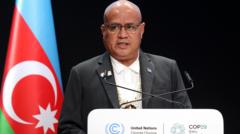The significance of this launch was underscored during a ceremony at the National Bank of Tuvalu in Vaiaku, attended by key dignitaries, including traditional leaders and parliament members. Prime Minister Teo expressed his enthusiasm, stating that this technological transition signifies the movement from an "analogue space" to a new digital era, reflecting the country's aspirations.
Prior to this, Tuvaluans faced the inconvenience of physically queuing at banks for financial transactions, especially during paydays. The introduction of cash machines marks a shift in this dynamic, as it allows for electronic payments in shops and grants access to cash without the long waits previously experienced. Initially, these machines will only support prepaid cards, but the bank intends to expand services to include international debit and credit cards in the future, promising greater economic empowerment to local citizens.
The head of the national bank, Siose Penitala Teo, echoed this sentiment, emphasizing that the move to digital banking will not only modernize financial transactions but also boost local businesses by facilitating easier payments.
Tuvalu, a nation of nine low-lying islands in the South Pacific, while making strides in digital finance, continues to confront climate challenges, particularly rising sea levels due to climate change. This challenge was poignantly highlighted by Prime Minister Teo during his address at the COP29 Climate Conference in Azerbaijan, where he warned of the existential threat posed by climate change to the islands’ future.
As Tuvalu embraces this pivotal economic change, the nation stands at the intersection of technological advancement and urgent climate challenges, aiming for sustainable development for its people while advocating for global action on climate issues.
Prior to this, Tuvaluans faced the inconvenience of physically queuing at banks for financial transactions, especially during paydays. The introduction of cash machines marks a shift in this dynamic, as it allows for electronic payments in shops and grants access to cash without the long waits previously experienced. Initially, these machines will only support prepaid cards, but the bank intends to expand services to include international debit and credit cards in the future, promising greater economic empowerment to local citizens.
The head of the national bank, Siose Penitala Teo, echoed this sentiment, emphasizing that the move to digital banking will not only modernize financial transactions but also boost local businesses by facilitating easier payments.
Tuvalu, a nation of nine low-lying islands in the South Pacific, while making strides in digital finance, continues to confront climate challenges, particularly rising sea levels due to climate change. This challenge was poignantly highlighted by Prime Minister Teo during his address at the COP29 Climate Conference in Azerbaijan, where he warned of the existential threat posed by climate change to the islands’ future.
As Tuvalu embraces this pivotal economic change, the nation stands at the intersection of technological advancement and urgent climate challenges, aiming for sustainable development for its people while advocating for global action on climate issues.



















